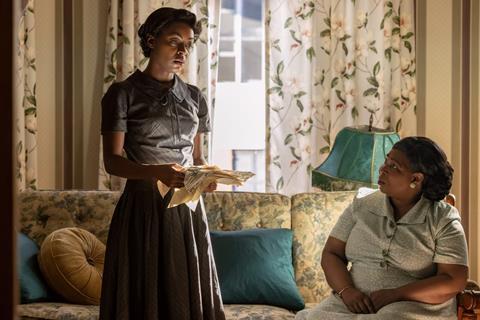The story of the racist murder of 14 year-old Emmett Till and his mother’s fight for justice

Dir: Chinonye Chukwu. US. 2022. 130mins
The 1955 lynching of 14 year-old Emmett Till remains one of the most horrifying examples of America’s racial inequality, a brutal crime that forced the country to examine the violence and bigotry which have only persisted over subsequent decades. Till struggles to do justice to such a harrowing story, positioning the narrative from the perspective of Till’s mother, Mamie Till-Mobley, a widow who had to find the strength to fight for her son. Following up her Sundance prizewinner Clemency, director Chinonye Chukwu brings intelligence, sorrow and rage to what eventually becomes a courtroom drama, but the film is most effective when it pushes against its conventionality, locating the psychic scars within this woman and the nation.
If the actual events prove more compelling than Chukwu’s dutiful treatment, the film wisely lets their horror speak for themselves
Till premieres at the New York Film Festival before opening in the US on October 14. (In the UK, it will play the London Film Festival and release mid-January.) Outside of EGOT recipient Whoopi Goldberg, who has a small role as Till-Mobley’s mother and also serves as producer, there aren’t many big names among the cast. Indeed, the actual story will be the main draw — especially for American audiences — although the tough subject matter may keep some away.
Danielle Deadwyler stars as Mamie, a doting mother living in Chicago with her ebullient, mischievous son Emmett (Jalyn Hall), nervous that he will be heading down to Mississippi to spend time with his cousins. Well-aware how much more dangerous it is for Black people in the South, Mamie warns Emmett to be mindful, but after he innocently whistles at pretty shopkeeper Carolyn Bryant (Haley Bennett), he crosses an invisible line, prompting some white men to grab him in the middle of the night and kill him. Shocked and angry, Mamie becomes focused on ensuring that his murderers go to prison — even if that means risking her safety to travel to Mississippi for the trial.
There’s a respectful, earnest quality to Till that can’t help but feel like the filmmakers’ self-conscious attempt not to put a foot wrong with such an important story. But unlike Clemency, with its reserved but emotional portrait of a prison warden grappling with the toll of executing criminals, Till rarely delves into its characters with the same clarity. Mamie is depicted as an everywoman forced to be brave and defiant in the midst of unimaginable sorrow. Chukwu’s compassion for her main character is palpable, but that empathy can sometimes reduce Mamie to being a noble martyr whose nuances and inner world are left unexplored.
One could argue, however, that this is part of Till’s point: for Mamie, nothing else matters after her son’s killing, and so the film takes on the air of a terse procedural as she navigates the press, well-meaning civic leaders and a racist Mississippi legal system to give Emmett some small measure of justice. At times, that muted approach is enormously affecting, such as when we finally see Emmett’s grotesquely swollen face — an image that has been damning and traumatic for Americans for nearly 70 years, and remains shocking. But the restraint also results in a dramatic timidity that can keep the narrative mournful, but not especially galvanising.
Deadwyler has not been given an easy assignment, playing a manifestly ordinary woman consumed by grief who becomes the very public champion of her slain son. Because Till doesn’t present much of Mamie’s backstory, the actress must bring dimension to a character who is meant to be somewhat opaque. The performance is only a qualified success, dignified if also a bit distant, but there are lacerating moments, such as when she finally confronts the family member who could have possibly done more to protect her boy but didn’t — and, later, when she finally testifies, the camera trained on her face in a powerful unbroken shot as a cruel defence attorney tries to disparage Emmett’s character. In such instances, Deadwyler cuts through the character’s quiet dignity to get at the raw wound with which Mamie now lives.
Admittedly, the film’s courtroom drama is a fairly straightforward affair, Chukwu preferring a clear presentation of the facts to cheap theatrics. Even for those who don’t know the outcome, Till subtly hints at how slow justice can be. If the actual events prove more compelling than Chukwu’s dutiful treatment, the film wisely lets their horror speak for themselves. In its modest, sometimes sluggish approach, the film perhaps takes its cue from Mamie, who at one point talks about the heartache and self-doubt that all mothers endure: “We do the best we can,” she offers. Despite Till’s shortcomings, the picture honours her simple, sincere devotion.
Production companies: Eon, Frederick Zollo Productions
International sales: MGM/Orion
Producers: Keith Beauchamp, Barbara Broccoli, Whoopi Goldberg, Thomas Levine, Michael Reilly, Frederick Zollo
Screenplay: Michael Reilly & Keith Beauchamp and Chinonye Chukwu
Cinematography: Bobby Bukowski
Production design: Curt Beech
Editing: Ron Patane
Music: Abel Korzeniowski
Main cast: Danielle Deadwyler, Jalyn Hall, Kevin Carroll, Frankie Faison, Haley Bennett, Jayme Lawson, Tosin Cole, Sean Patrick Thomas, John Douglas Thompson, Roger Guenveur Smith, Whoopi Goldberg






















